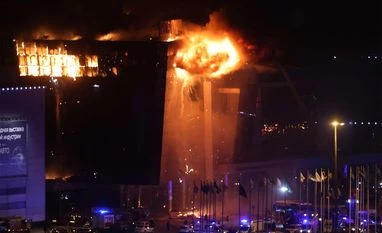On March 22, a group of terrorists launched a brutal assault on a sprawling concert hall in Moscow. The assailants opened fire on the unsuspecting crowd, leading to the death of over 60 lives and leaving over 100 others injured. The attackers also set the venue ablaze. The attack comes shortly after Russian president Vladimir Putin cemented his authority in the country securing his fifth term through reelection with 87% of vote.
The attack took place during a performance by the Russian rock band Picnic at Crocus City Hall, a sizable music venue on the outskirts of Moscow, capable of hosting 6,200 attendees. The Investigative Committee, Russia’s primary criminal investigation body, disclosed early Saturday that the death toll surpassed 60, with health authorities compiled a list of 145 wounded individuals. Of these, 115 required hospitalisation, including five children.
How did the Moscow blast happen?
In the city’s western outskirts on Friday night, a group of at least five gunmen, dressed in camouflage and armed with automatic weapons, stormed into a crowded Crocus City Hall where the audience had gathered to attend a performance by the veteran rock band Picnic. They indiscriminately fired into the crowd and triggered explosives, igniting a massive fire.
The attack, which led to the concert hall being engulfed in flames and its roof collapsing, marks one of the deadliest incidents in recent Russian history. It coincides with Russia’s conflict in Ukraine, now entering its third year. Moscow’s Mayor Sergei Sobyanin described the event as an “immense tragedy”.
Who is responsible for the terrorist attack in Russia?
Soon after the attack, an Islamic State (ISIL) group, the ISIS-Khorasan claimed accountability for the incident through a statement disseminated on affiliated social media channels. The ISIS-K group said in its statement that its fighters had launched an attack on the outskirts of Moscow, resulting in casualties numbering in the hundreds and causing extensive damage to the venue before retreating to their bases unharmed.
As per reports, multiple incidents involving the Islamic State occurred throughout the month in Russia. Among these was the reported killing of six alleged members of the group in a confrontation in Ingushetia, situated in the volatile Caucasus region. Russia’s Federal Security Service (FSB) disclosed on March 7 that it had thwarted an ISIL attack in Khorasan Province (ISKP), an Afghan affiliate of ISIL, targeting a synagogue in Moscow.
The United States has also issued warnings regarding the heightened threat level. Shortly after the FSB’s announcement, the US embassy in Moscow issued an alert indicating that ‘extremists’ were planning an imminent attack in the city. Later that Friday night, a US official confirmed intelligence supporting ISIL’s claim of responsibility for the assault on Crocus City Hall.
More From This Section
How did the world leaders react to the Moscow terror attack?
The attack has drawn condemnation from leaders around the globe. United Nations Secretary-General Antonio Guterres expressed his shock and condemned the attack in the strongest terms possible, while the UN Security Council denounced it as a “heinous and cowardly terrorist attack”.
French President Emmanuel Macron condemned the attack, which was claimed by the Islamic State, and expressed France’s solidarity with the victims, their families, and the Russian people. “France expresses its solidarity with the victims, their loved ones and all the Russian people,” he was quoted saying.
Prime Minister Narendra Modi also denounced the attack as a “heinous act of terrorism” and pledged solidarity with the Russian government and people. “We strongly condemn the heinous terrorist attack in Moscow. Our thoughts and prayers are with the families of the victims. India stands in solidarity with the government and the people of the Russian Federation in this hour of grief,” the Prime Minister wrote on social media platform X (formerly Twitter).
Spain also expressed shock at the events in Moscow, while Italian Prime Minister Giorgia Meloni condemned the attack as “odious” and expressed full solidarity with the affected individuals and their families.
Which terrorist organisation was behind the Moscow bombing?
The terrorist organisation named ISIS-K, derived from an old term for the Khorasan region encompassing parts of Iran, Turkmenistan, and Afghanistan, emerged in eastern Afghanistan in late 2014, quickly gaining notoriety for its extreme brutality.
Although one of the most active regional affiliates of the Islamic State militant group, ISIS-K has seen its membership decline since peaking around 2018. According to media reports, one of the main reasons has been the heavy losses inflicted by both the US forces and the Taliban in the region.
Reportedly, the US intercepted communications confirming the group carried out twin bombings in Iran that killed nearly 100 people earlier this year.
In September 2022, the ISIS-K militants claimed responsibility for a deadly suicide bombing at the Russian embassy in Kabul, Afghanistan. The group was also responsible for an attack on Kabul’s international airport in 2021 that killed 13 US troops and scores of civilians during the chaotic US evacuation from the country.
Before the Islamic group had claimed responsibility for the Crocus City Hall attack, Russia had issued a threat to Ukraine saying that it would find and destroy Ukraine’s top officials if they were linked to the gun attack outside Moscow.
)